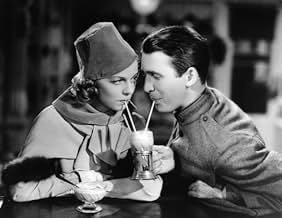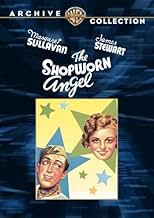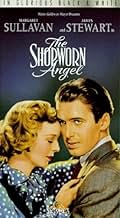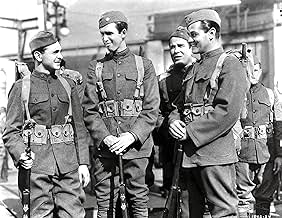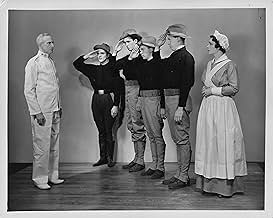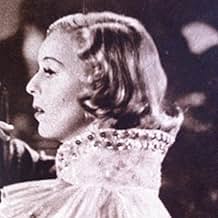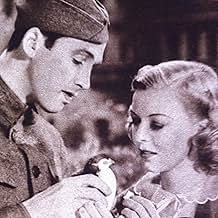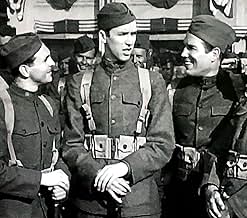AVALIAÇÃO DA IMDb
6,9/10
1,8 mil
SUA AVALIAÇÃO
Adicionar um enredo no seu idiomaShortly after the United States enters World War I in 1917, a Broadway actress agrees to let a naive soldier court her in order to impress his friends, but a real romance soon begins.Shortly after the United States enters World War I in 1917, a Broadway actress agrees to let a naive soldier court her in order to impress his friends, but a real romance soon begins.Shortly after the United States enters World War I in 1917, a Broadway actress agrees to let a naive soldier court her in order to impress his friends, but a real romance soon begins.
- Direção
- Roteiristas
- Artistas
- Prêmios
- 3 vitórias no total
Charley Grapewin
- Wilson - Caretaker
- (cenas deletadas)
Wade Boteler
- Irish Policeman
- (não creditado)
Don Brodie
- Candy Store Attendant
- (não creditado)
Jimmy Butler
- Jack - Elevator Boy
- (não creditado)
Eddy Chandler
- Corporal
- (não creditado)
George Chandler
- Tommy - Soldier
- (não creditado)
Roger Converse
- Hotel Clerk
- (não creditado)
James Flavin
- Guard Yelling 'Halt!'
- (não creditado)
Avaliações em destaque
This is a surprisingly touching movie. It presents the "marry the soldier who is shipping out to near certain death" story, which would play out in real life when the US entered WWII, but in this case, prior to that entry, with a soldier shipping out to France in 1917.
Stewart plays it simple, which works here. He is a sympathetic catalyst who somehow brings the true lovers together in a roundabout manner. Walter Pidgeon is really good here - maybe the best I've seen him - in that he avoids his more typical coolness for genuine vulnerability. The ending in telegraphed, but still sad in that way you love movies to be sad.
Stewart plays it simple, which works here. He is a sympathetic catalyst who somehow brings the true lovers together in a roundabout manner. Walter Pidgeon is really good here - maybe the best I've seen him - in that he avoids his more typical coolness for genuine vulnerability. The ending in telegraphed, but still sad in that way you love movies to be sad.
Shy young soldier James Stewart is picked on by his fellow soldiers for not being a ladies man. Jaded showgirl Margaret Sullavan agrees to help him out by pretending to be his girlfriend. He quickly falls in love with her for real but things are complicated by his having to ship out for the war and her already having a boyfriend (Walter Pidgeon).
The second of four movies pairing Stewart and Sullavan. Their chemistry is remarkable as always. This one doesn't turn out how you might think and I can easily see many viewers being disappointed. It builds up towards one thing but shifts gears 3/4 of the way through and becomes something else. I still enjoyed it, though.
The second of four movies pairing Stewart and Sullavan. Their chemistry is remarkable as always. This one doesn't turn out how you might think and I can easily see many viewers being disappointed. It builds up towards one thing but shifts gears 3/4 of the way through and becomes something else. I still enjoyed it, though.
What others might say is a lack of chemistry between Stewart and Sullavan in this charming picture, is what I call "acting".
People from widely different social circles react to situations differently. It is evident that the rich talents of these two actors contributed strongly to the feeling question of their compatibility.
That is the whole point of this story! The examination of things that sometimes happen during a war between unlikely pairings.
Without trying to reveal any of the story, I will say that one never felt as if Sullavan portrayed the complexity of her character without conviction, in fact, she did it admirably. She merely expressed it in the only way that a person of another "class" from Stewart's would. What I did find refreshing in Sullavan's character, although taken from the mold of a Broadway star, she displayed none of the expected snobbery which those parts normally include. It made her character all the more likeable.
Stories about romance during a war are filled with stories that sound fantastic - but may have very well occurred. This movie is no exception and I took that perspective into account as I watched the story unfold.
I would recommend this movie to any fan of James Stewart or Margaret Sullavan. They delivered their parts with originality and a lack of staleness which is normally associated with such simple stories.
People from widely different social circles react to situations differently. It is evident that the rich talents of these two actors contributed strongly to the feeling question of their compatibility.
That is the whole point of this story! The examination of things that sometimes happen during a war between unlikely pairings.
Without trying to reveal any of the story, I will say that one never felt as if Sullavan portrayed the complexity of her character without conviction, in fact, she did it admirably. She merely expressed it in the only way that a person of another "class" from Stewart's would. What I did find refreshing in Sullavan's character, although taken from the mold of a Broadway star, she displayed none of the expected snobbery which those parts normally include. It made her character all the more likeable.
Stories about romance during a war are filled with stories that sound fantastic - but may have very well occurred. This movie is no exception and I took that perspective into account as I watched the story unfold.
I would recommend this movie to any fan of James Stewart or Margaret Sullavan. They delivered their parts with originality and a lack of staleness which is normally associated with such simple stories.
The Waldo Salt screenplay takes a small story and develops it into an affecting portrait of three surprisingly convincing and complex human characters, all of whom transcend the typical dramatic constraints of late '30s Hollywood. All three principals turn in excellent, low-key performances in perfect keeping with the film's narrative strengths. I find it particularly interesting to compare this with the other bookend to Salt's screenwriting career, Coming Home, also a character-driven story that revolves around the complex, three-way relationship between a woman and the two men who love her in a time of war.
There's no doubt that THE SHOPWORN ANGEL uses a plot that has been used countless times in movies and books over the years. It's the story of a selfish actress (MARGARET SULLAVAN) suddenly succumbing to the country boy charm of a soldier (JAMES STEWART) who is about to be sent overseas in WWII. Meanwhile, she has her agent WALTER PIDGEON, whom she depends upon for emotional support and love. Surely, there is nothing new about the bare outline of the plot.
But what works in the story's favor is the simplicity and charm of the three leads. Sullavan is more radiant than usual as a glamorous actress rather than the drab little wren she usually played and she plays her part in a refreshing manner that is almost able to overcome the idea that she should suddenly turn so noble. Despite this flaw in the characterization, it's a very winning performance that she gives.
Likewise, JAMES STEWART does wonders with a thinly devised role of the country bumpkin who falls impetuously in love with an actress, even to the point of asking her to marry him before he goes overseas. At this point, the plot's outcome becomes telegraphed because we know this is a Margaret Sullavan film and tearful romantic dramas have been her specialty. Thus, the ending becomes a forgone conclusion.
WALTER PIDGEON is her kindly suitor who has the wisdom to make the best of a situation he's not exactly comfortable with. He anchors the story with his sensitive performance as the man who can always be depended on to give the heroine the emotional support she needs. He's also got an abundant sense of humor that the story needs.
It's a trifle of a film, but beautifully acted and given a lift by the winsome performances of its three leads, moving at a brisk pace to the Hollywood ending. HATTIE McDANIEL is her usual delightful self as Miss Sullvan's down-to-earth maid.
But what works in the story's favor is the simplicity and charm of the three leads. Sullavan is more radiant than usual as a glamorous actress rather than the drab little wren she usually played and she plays her part in a refreshing manner that is almost able to overcome the idea that she should suddenly turn so noble. Despite this flaw in the characterization, it's a very winning performance that she gives.
Likewise, JAMES STEWART does wonders with a thinly devised role of the country bumpkin who falls impetuously in love with an actress, even to the point of asking her to marry him before he goes overseas. At this point, the plot's outcome becomes telegraphed because we know this is a Margaret Sullavan film and tearful romantic dramas have been her specialty. Thus, the ending becomes a forgone conclusion.
WALTER PIDGEON is her kindly suitor who has the wisdom to make the best of a situation he's not exactly comfortable with. He anchors the story with his sensitive performance as the man who can always be depended on to give the heroine the emotional support she needs. He's also got an abundant sense of humor that the story needs.
It's a trifle of a film, but beautifully acted and given a lift by the winsome performances of its three leads, moving at a brisk pace to the Hollywood ending. HATTIE McDANIEL is her usual delightful self as Miss Sullvan's down-to-earth maid.
Você sabia?
- CuriosidadesBroadway musical-comedy star Mary Martin provides the singing voice for Margaret Sullavan. This same year she also dubbed the singing voice for Gypsy Rose Lee in Casaremos Amanhã (1938). Modern sources indicate that Universal's A Sensação de Paris (1938), which was filmed at approximately the same time as The Shopworn Angel was Martin's first film "bit" role. According to records of the M-G-M Music Collection at the USC Cinema-Television Library, Martin's recording of "Pack Up Your Troubles in Your Old Kit Bag and Smile, Smile, Smile was made on 1 June 1938.
- Erros de gravaçãoBill mails his postcards after leaving the soda fountain, seemingly without putting any stamps on them, but on one shot while he's sitting at the lunch counter you can see stamps on the cards. However, in the next close-up, just before he leaves, the cards are unstamped. The likely reason is that all the closeup shots where he's writing on the blank cards were filmed together with the same camera setup, and the long shots were shot later after stamps were added. (Perhaps they filmed a scene of Bill buying and affixing stamps but decided not to use it.)
- Citações
Pvt. William 'Texas' Pettigrew: Dying's a lot like being in love. You can't imagine it until its right on top of you.
- ConexõesFeatured in AFI Life Achievement Award: A Tribute to James Stewart (1980)
- Trilhas sonorasYou're In The Army Now
(1917) (uncredited)
Music by Isham Jones
Lyrics by Tell Taylor and Ole Olsen
Played as background music for marching soldiers
Principais escolhas
Faça login para avaliar e ver a lista de recomendações personalizadas
- How long is The Shopworn Angel?Fornecido pela Alexa
Detalhes
- Data de lançamento
- País de origem
- Idioma
- Também conhecido como
- The Shopworn Angel
- Locações de filme
- Empresa de produção
- Consulte mais créditos da empresa na IMDbPro
Bilheteria
- Orçamento
- US$ 531.000 (estimativa)
- Tempo de duração
- 1 h 25 min(85 min)
- Cor
- Proporção
- 1.37 : 1
Contribua para esta página
Sugerir uma alteração ou adicionar conteúdo ausente


